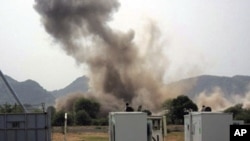Amnesty International says the arms trade is fueling conflicts between northern and southern Sudan. It’s calling on the world’s major powers to control arms shipments to regions such as Southern Kordofan State.
Fighting in the state has been going on for weeks displacing thousands of people. Various groups have accused Khartoum’s Sudan Armed Forces of targeting civilians.
“What we have is Chinese and Russian arms supplies that have been ongoing to Sudan for the last few years and they are the biggest arms suppliers. And different types of weaponry being used in violation of international humanitarian law and international human rights law,” said Helen Hughes, a researcher for Amnesty International.
Amnesty said these include the Russian-made Antonov aircraft and SU-25 fighter jets “being used in indiscriminate attacks in Southern Kordofan.”
“In terms of South Sudan,” Hughes said, “the USA has invested heavily in military assistance and training to the Sudanese Peoples Liberation Army. But Amnesty is reporting that the army is committing human rights violations and unlawful killings, for example. And from the little information that is publically available about that training there doesn’t seem to be any indication that the SPLA is being trained on international human rights law and international law, which is absolutely vital for a professional army.”
Arms Trade Treaty
Arms Trade Treaty (ATT) talks are scheduled to continue next week at the United Nations in New York. Negotiations have been underway for the past few years.
“There’s a negotiation of the final text in June 2012,” Hughes said. “And the focus of this week’s talks will be on the implementation of the treaty. It’s absolutely vital that the U.S., for example, if it wants to prevent the kinds of human rights violations and indiscriminate attacks that have been ongoing recently in Southern Kordofan and elsewhere, needs to throw its political weight behind [it], ensuring that the ATT is going to be effective,”.
She said the U.S., as the world’s largest arms supplier, “could really send a positive signal to the likes of Russia and China and many other member states.”
Hughes added, “This treaty isn’t going to be a panacea for all of the problems. It’s going to be a preventative tool. It’s about trying to prevent the transfer of arms where’s there’s going to be this substantial risk. And in places like Sudan it could make a difference.”
But the United States, Russia and China often have not signed major international weapons treaties.
“Certainly when you look to the landmine treaty and the cluster munitions treaty, there you have the evidence of what you’re describing. At the moment, no state is actively opposing the Arms Trade Treaty,” she said.
Treaty talks are scheduled for July 11-15.




